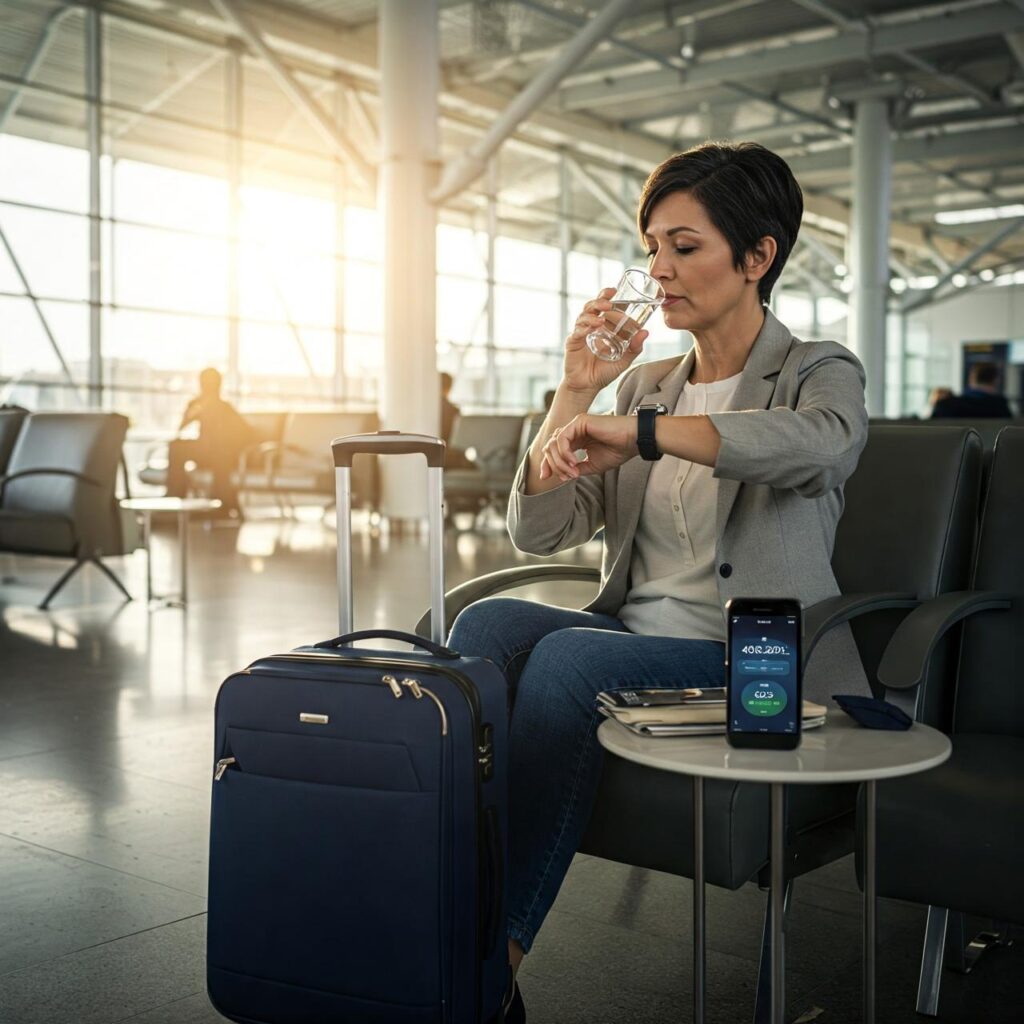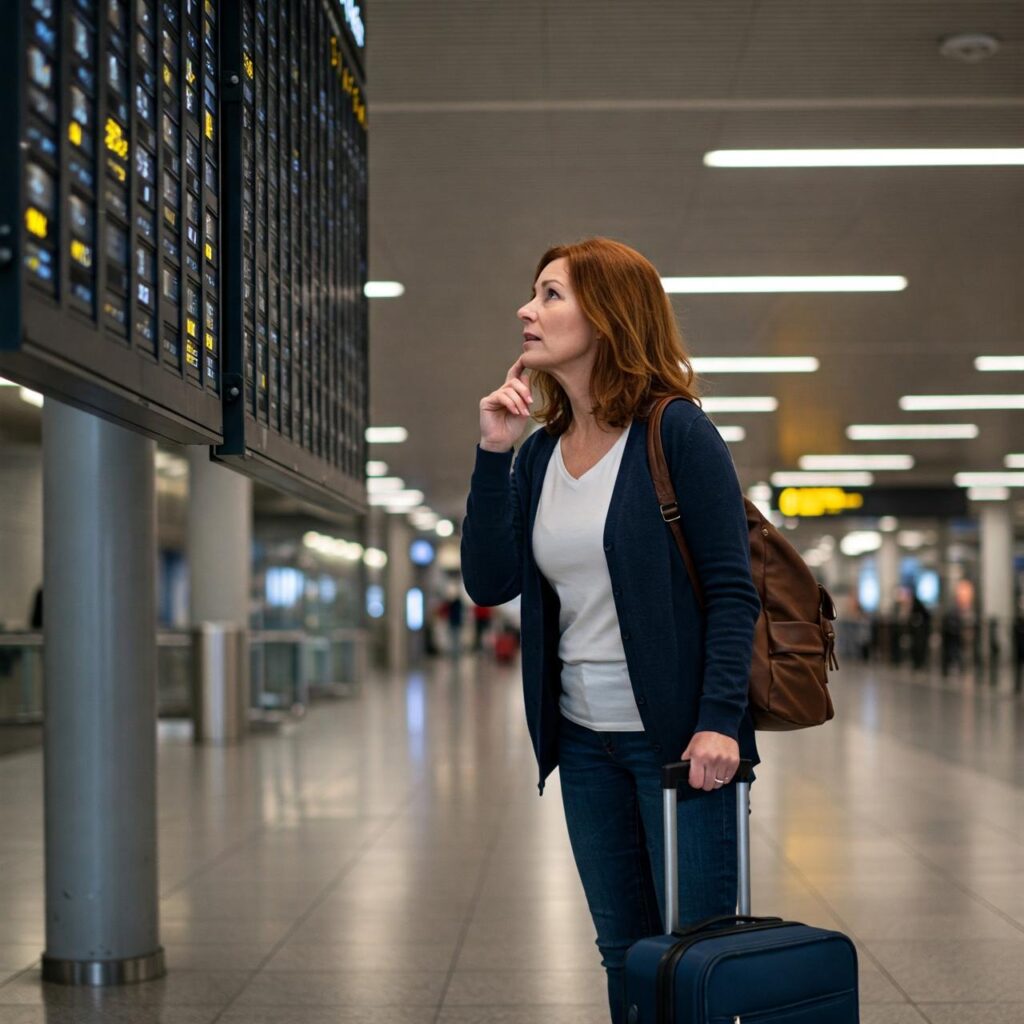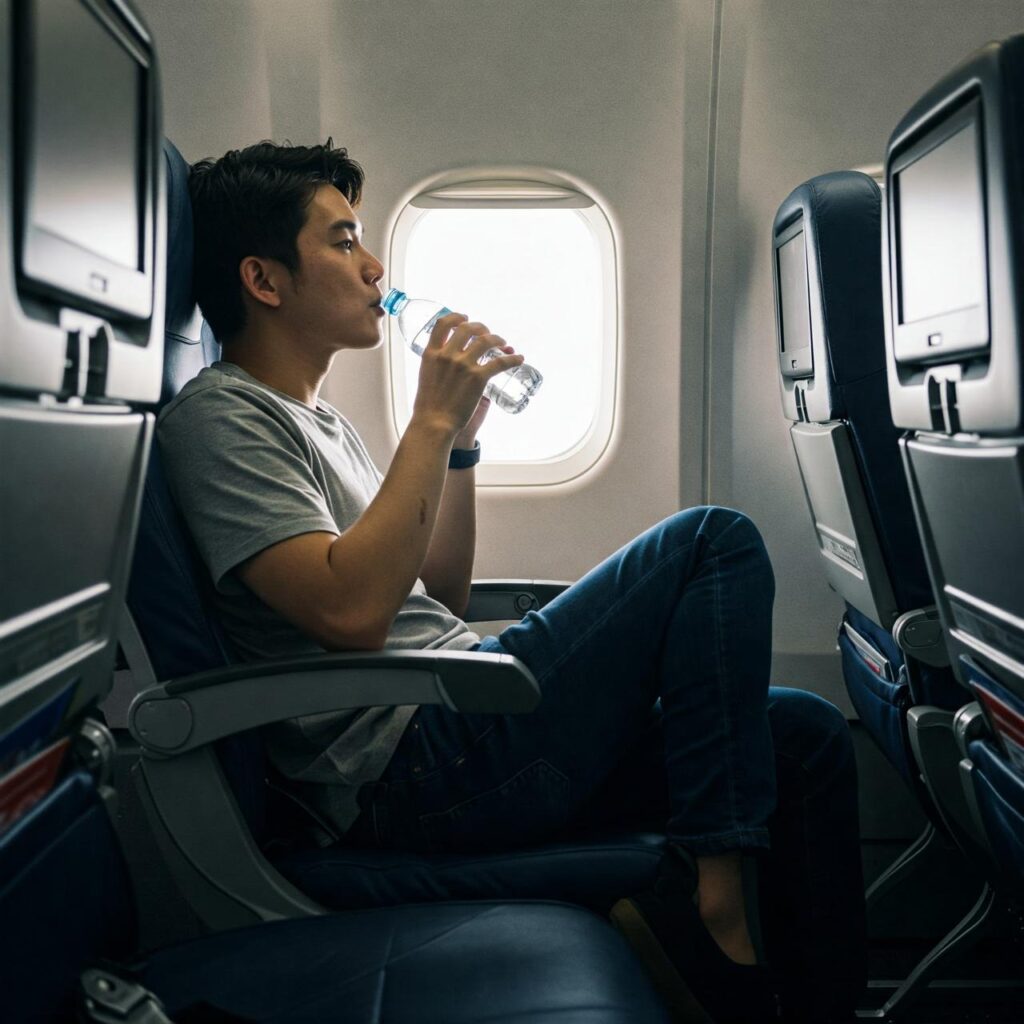Jet lag can be challenging, but with the right strategies, you can adjust quickly and enjoy your trip. Whether traveling for business, vacation, or a competition, crossing multiple time zones can disrupt your body’s internal clock, leading to sleep disturbances and fatigue. So, knowing the best ways to deal with jet lag is crucial.
Simple steps like adjusting your schedule before departure, staying hydrated, getting sunlight, and following local time can help reset your rhythm. By planning and being mindful of your sleep, diet, and stress levels, you can minimize jet lag and maximize your travels. This blog will explore the best ways to deal with jet lag and ensure a smoother transition to your destination.

Jet lag happens when you travel across multiple time zones, disrupting your body’s internal clock. Usually, your body follows a sleep-wake cycle based on daylight and darkness. But when you land in a new time zone, this rhythm gets mixed up, making it hard to sleep at night and stay awake during the day. That’s why knowing the best ways to deal with jet lag can make a huge difference in adjusting faster and feeling refreshed.
The more time zones you cross, the worse jet lag can be. Traveling east is more challenging because your body struggles to adjust to a shorter day. It usually takes about one day per time zone for your body to adapt thoroughly.
Jet lag affects people differently. Some recover quickly, while others take longer. Frequent travelers, such as pilots and flight attendants, experience it more often, and older adults may take longer to adjust. Research even suggests that jet lag can affect mood—causing low energy and sadness after westward travel and bursts of high energy after flying east.
Jet lag feels different for everyone. The farther you travel, the harder it is for your body to adjust.
If you lose several hours while traveling, you might struggle to fall asleep at night because your body still thinks it’s daytime.
If you gain hours, you might feel sleepy during the day because your body thinks it’s still nighttime back home.
Jet lag can make you feel off when you travel to a different time zone. Some common signs include:
Difficulty focusing or remembering things: You may feel foggy and struggle to concentrate.
Jet lag happens when you fly across three or more time zones, and your body’s internal clock doesn’t match the new day and night schedule.
Flying worsens jet lag because your body moves faster than your brain can adjust. Other things during travel can also make it harder to recover, like:
Anyone can get jet lag, but some things make it more likely:
If you’re looking for the best ways to deal with jet lag, these ten strategies will help you recover faster and enjoy your trip.
A few days before your trip, try to match your sleep time with your destination’s time zone. If you’re traveling east, start going to bed earlier each night. If you’re heading west, stay up a little later.
This gradual shift helps your body adjust before leaving, making it easier to avoid jet lag when you arrive. Among the best ways to deal with jet lag, altering your sleep schedule in advance can make a big difference in how quickly you adapt. Also, try to wake up at the right time for your new location so your body gets used to the new routine.
One of the best ways to deal with jet lag is to arrive a few days early before an important event or meeting. This gives your body time to adjust to the new time zone so you feel more awake and focused when it matters most.
Arriving early also helps you get used to your surroundings, making you feel more comfortable. Plus, you’ll have time to explore and relax, which can reduce travel stress and help you feel at home in a new place.

Light helps your body know when to sleep and wake up. To adjust faster to a new time zone, follow these tips:
If you cross eight or more time zones, your body might get confused. If you’re traveling east, try wearing sunglasses in the morning and getting sunlight in the afternoon for the first few days.
Adjusting light exposure before departure can be one of the best ways to deal with jet lag and speed up recovery. This small change helps your body clock reset faster, making jet lag easier to handle!

You’ll struggle to adjust if you nap at 4 p.m. and wake up at midnight. Instead, try to stay awake until the evening. Go for a walk, get fresh air, and enjoy sunlight—these will help your body adapt faster.
You might wake up early the first morning, and that’s okay! Instead of forcing yourself to sleep, take a walk and enjoy the sunrise. Following the best ways to deal with jet lag, like staying active during the day, will help you adjust faster and feel refreshed.
If you can choose your seat, go for an aisle seat for more space and comfort. Upgrade for extra legroom. But if you end up in the middle seat, don’t worry! Wear comfy clothes, bring a sleep mask and earplugs, and use a neck pillow to help you sleep better and feel more rested.
Flying can cause dehydration and worsening jet lag symptoms. One of the best ways to deal with jet lag is to drink plenty of water before, during, and after your flight.

Avoid eating heavy meals during your flight or after landing, as they can make you feel too full and sleepy too soon. Instead, choose light foods like salads, fish, or chicken. Following the best ways to deal with jet lag, including eating smaller, nutrient-rich meals, can help your body adjust more smoothly.
Eating small portions whenever you feel hungry is better than having a large meal. It’s also important to pick healthy options—grabbing fruit instead of junk food can help keep your energy up and make it easier for your body to adjust to the new time zone.

Stress can make sleeping harder and adjusting to a new time zone more difficult. To avoid this, plan your trip ahead of time. Book your flights, hotels, and transportation early so you don’t have to worry about last-minute changes.
Give yourself extra time for delays, and stay relaxed if things don’t go as planned. When you manage stress well, your trip will be smoother, and your body will adjust faster to the new time zone. Staying calm and organized is one of the best ways to deal with jet lag before and during your travels.
Your body naturally makes melatonin to help you sleep, but you can also take it as a supplement. It can help you fall asleep at night or stay asleep if you wake up too early after traveling west.
If you’re thinking about trying melatonin, talk to your doctor first. They can check if it’s safe for you and will not cause problems with any other medicine you take.
Getting good sleep while traveling is easier if your space is comfy. Here’s how:
A comfortable sleep environment is one of the best ways to deal with jet lag and help you recover faster.
Most people with jet lag have mild symptoms that go away in a few days and usually don’t need to see a doctor.
But if jet lag makes it hard to function or doesn’t go away, talking to a doctor might help. If sleep problems continue, a doctor may suggest a sleep study. This test checks if another sleep issue is causing the trouble.
Recovering from jet lag takes different amounts of time for everyone. Usually, it takes about a day for each time zone you cross, but some people adjust faster or slower. However, applying the best ways to deal with jet lag can speed up the adjustment.
To recover more quickly, focus on getting good sleep, drinking plenty of water, and slowly adjusting to the new time zone.
Light exercise, avoiding caffeine before bed, and getting sunlight in the morning can also help. Most people feel normal again after a few days, but these steps can make the process easier.
There isn’t one perfect cure for jet lag, but a mix of smart choices can help you adjust faster. Taking melatonin, drinking herbal tea, or using magnesium might help you sleep better. Getting sunlight and staying hydrated can also reset your body clock.
The best trick depends on you and your trip, so try different things to see what helps. If you’re thinking about using supplements, check with your doctor first!
A short nap (about 20–30 minutes) can help you feel more awake without messing up your sleep at night. But be careful—napping too long can make it harder to fall asleep later, making it take longer to adjust to the new time zone. If you’re tired, try staying active by walking or doing something light to keep yourself awake!
Jet lag can be challenging, but technology can make adjusting easier. Here are five gadgets and apps designed to help your body adapt to a new time zone faster:
Timeshifter is an app designed to help travelers reduce jet lag using sleep and circadian rhythm research. It creates a personalized plan based on age, gender, sleep habits, and travel details.
The app recommends when to get sunlight, nap, stay awake, or use melatonin or caffeine. It also includes a unique feature to help business travelers adjust quickly during short trips.
The app’s easy-to-read notifications offer reminders to get bright light, avoid caffeine, or go to sleep.
StopJetLag is an app that helps travelers adjust their body clocks and avoid jet lag. It gives personal advice on when to sleep, get sunlight, eat (including meal sizes), exercise, and drink caffeine. After entering trip details, users receive a downloadable plan with a schedule, notes, and mobile alerts.
The app also suggests the best flight times to reduce jet lag, which can be helpful for those who haven’t booked their tickets yet.
Insight Timer is a popular free meditation app that can help you relax and sleep better. It won’t completely stop jet lag, but listening to calming sounds like meditation bells or a yoga nidra session might help you fall asleep on a plane or at your destination. The app has nearly 130,000 meditations, so there’s a good chance you’ll find one that works.
The Uplift app uniquely helps travelers fight jet lag by using biorhythmic acupressure. After entering your trip details, like departure and arrival cities, dates, and times, Uplift gives you simple exercises to do when you land. A video shows you how to press specific points on your body for a minute, naturally helping your body adjust to the new time zone.
A white-noise app can help you sleep better on a flight or at your destination, making it easier to beat jet lag. BetterSleep has different sound options, such as animal noises, city sounds, music, nature, and ASMR.
You can mix multiple sounds, adjust their volume, and create a relaxing combination, like rain with a soft piano or a cat purring. Once you find a mix you like, you can save it for later.
The app also has meditations, breathing exercises, and guided sleep routines called “Sleep Moves.” Some of these are made to help with jet lag or improve sleep while traveling.
Flying from New York to Dubai tired me, but I knew a nap would mess up my schedule, so I booked a desert safari tour. The fun of dune bashing, camel riding, and watching the sunset in the big dunes kept me going. By sleep time, I was exhausted, but I woke up the next day feeling adjusted.
Flying from Sydney to Marrakech left me feeling drained and dizzy. A local guide told me to drink fresh mint tea and lots of water instead of relying on coffee or energy drinks. Staying hydrated made a huge difference—I avoided headaches and adjusted to the time zone much faster.
Arriving in Chile from Tokyo meant I had a complete time-zone flip. Instead of staying indoors, I took a light hike in Torres del Paine National Park. The fresh air, movement, and stunning views naturally energized me and helped my body adjust to the new rhythm.
Jet lag can be frustrating, but using the best ways to deal with jet lag can make a significant difference. Simple steps like changing your schedule before travel, staying hydrated, getting sunlight, and following local time can help reset your body clock.
Technology can also help. Apps like Timeshifter, StopJetLag, Insight Timer, Uplift, and BetterSleep make the transition easier.
While recovery time varies, being mindful of your sleep, diet, and stress levels can make the transition smoother. Planning, using helpful tools, and listening to your body can minimize jet lag and make the most of your travels.
Start following your new time zone to beat jet lag quickly. Try to sleep at night and stay awake during the day. Drink plenty of water to stay hydrated and spend time in sunlight to help your body adjust. Eating healthy meals and avoiding heavy food can also make the transition easier.
Experts say that jet lag is usually worse when flying east. This is because it’s easier for your body to stay up later than to go to sleep earlier than usual.
Jet lag is prevalent when traveling across time zones but affects people differently. Some people, especially kids, adjust quickly and may not notice it, while others take longer to adapt.